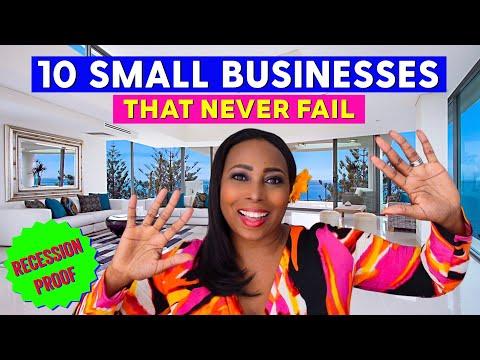Navigating the economic downturn of 2024 has been a challenging yet eye-opening experience. I remember vividly the moment I realized that the financial landscape was shifting dramatically. The recession had hit hard, and job security was becoming a thing of the past. I found myself in a precarious situation, scrambling to figure out how to secure my financial future amidst the economic chaos. It was during this tumultuous period that I stumbled upon a realization: the key to thriving in a recession isn’t just about surviving; it’s about adapting and seizing opportunities.
I began to explore various avenues that could offer stability and growth, even in a shaky economy. After much research and deliberation, I identified ten small businesses that seemed particularly promising for anyone looking to make a significant financial impact despite the downturn. Each of these business ideas has its own unique set of advantages and can be adapted to fit different skill sets and interests.
One of the first ideas that caught my attention was starting a virtual assistance business. With more companies reducing overhead costs and shifting to remote work, there was an increasing demand for virtual assistants who could handle administrative tasks, customer service, and more. The beauty of this business lies in its low startup costs and the flexibility it offers. By leveraging my organizational skills and experience with various administrative tools, I was able to build a client base relatively quickly. The key was to market my services effectively and to provide exceptional support to my clients.
Another lucrative opportunity I discovered was in the realm of online tutoring and coaching. As educational institutions increasingly adopted remote learning, there was a surge in demand for personalized tutoring services. Whether it’s academic subjects, test preparation, or even niche skills like coding or graphic design, there’s a vast market for knowledgeable tutors. By capitalizing on my own expertise in a particular field and using online platforms to connect with students, I was able to create a steady income stream. The flexibility of scheduling and the ability to work from home made this an attractive option.
In the face of economic uncertainty, people often look for ways to save money, and that’s where the idea of starting a financial consulting business comes in. With a background in finance and a passion for helping others manage their money, I decided to offer services such as budgeting, debt management, and investment advice. As financial pressures mounted for many individuals and small businesses, my expertise became a valuable asset. Building trust with clients through transparent and practical advice was crucial to growing my consultancy.
E-commerce has always been a thriving sector, but the recession presented unique opportunities to enter niche markets. I decided to start an online store focused on eco-friendly products. With growing awareness around sustainability, there was a demand for environmentally conscious alternatives. By sourcing high-quality, sustainable products and marketing them effectively, I was able to tap into a niche market that continued to grow even during economic downturns. The key to success here was understanding consumer trends and leveraging social media to build a brand presence.
Another small business idea that proved to be successful during the recession was offering home repair and maintenance services. As people focused on maintaining and improving their existing homes rather than investing in new properties, the demand for reliable and skilled tradespeople increased. I utilized my own handyman skills and networked within my community to build a reputation for quality work. Offering competitive pricing and exceptional service helped me stand out in a crowded market.
Pet services were another area where I found substantial growth. With more people adopting pets during the pandemic, the need for pet grooming, walking, and sitting services skyrocketed. By leveraging my love for animals and offering personalized care, I built a business that not only fulfilled a growing need but also brought a lot of personal satisfaction. Marketing through local networks and social media helped me attract clients who were willing to pay a premium for high-quality pet care.
Digital marketing services were in high demand as businesses sought to maintain their online presence during the recession. With a background in marketing and a knack for creating engaging content, I started offering services such as social media management, content creation, and SEO optimization. The key to thriving in this space was staying up-to-date with the latest trends and providing measurable results for my clients.
Starting a subscription box service was another innovative idea that proved successful. Subscription boxes offer curated selections of products delivered on a regular basis, and they can cater to a variety of interests, from gourmet foods to beauty products. By identifying a niche market and curating high-quality products, I was able to build a loyal customer base. The recurring revenue model provided financial stability, even in uncertain times.
Event planning and coordination became a viable business idea as people sought to celebrate small milestones and create memorable experiences despite the recession. By offering specialized services for intimate gatherings and virtual events, I tapped into a market that valued personalized and creative event solutions. The ability to adapt to different types of events and provide exceptional service helped me build a strong reputation in this field.
Finally, freelance writing and content creation offered a flexible and profitable business opportunity. With a strong command of language and an ability to produce engaging content, I started offering writing services to businesses and individuals. As content marketing became increasingly important, my skills in crafting compelling narratives and optimizing content for search engines became highly sought after.
Through these various business ventures, I found that resilience, adaptability, and a keen understanding of market needs were essential for success. Each of these opportunities provided a pathway to financial stability and growth, even during challenging economic times. By leveraging my skills, staying informed about market trends, and delivering exceptional value to my clients, I was able to navigate the recession and build a successful business portfolio.
